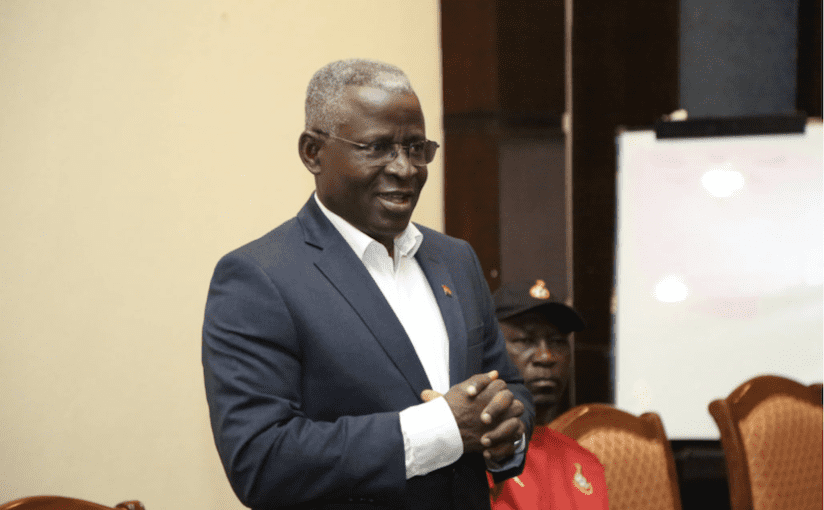Ghana, which is rich in natural resources, faces many financial and regulatory challenges to develop the country’s oil sector and meet the growing needs of citizens. Because of its dependence on the West, the lack of resources and the aging of the necessary infrastructure, in addition to being affected by the recent global energy crisis.
The last of these challenges was last year (2022); When the capital, Accra, witnessed escalating protests due to the high cost of living and a severe fuel crisis.
In this regard, Ghana’s ambassador to Cairo, Obaid Bwama Akwa, made special statements to the energy platform, about the fuel crisis in the country, oil production, and the repercussions of the Russian-Ukrainian crisis, in addition to the country’s nuclear ambitions.
Ghana fuel crisis
At the outset, Ambassador Abeid Bwama Akwa spoke about the fuel scarcity crisis that hit the West African country, saying that fortunately the government had pursued a “positive” strategy to overcome the fuel shortage over the past year (2022).
He affirmed his country’s success in overcoming the crisis, as evidenced by the disappearance of the queues to fill fuel tanks, and that electricity is currently working 24 hours a day without interruption, which pushes the industry forward to increase productivity, despite the natural suffering from the consequences of the current global economic crisis.
As he said, in his remarks to the energy platform: “We have no challenges now.”
Ghana has seen escalating protests over the rising cost of living; This prompted the government to take steps to address the fuel crisis.
In July 2022, Ghanaian Energy Minister Matthew Opoku Prembe and the Tanker Owners Association reviewed the project to establish a pipeline for oil products. The minister described it as crucial to solving the country’s fuel crisis.
This line extends from the capital, Accra, to the city of Kumasi, about 200 kilometers northwest of the Ghanaian capital, according to the Energy Voice platform.
Ghana’s oil production
Ambassador Abeid Bwama Akwa touched on the future of oil in his country, noting that Ghana is currently an oil-producing country.
He said, in exclusive statements to the energy platform: “Oil was discovered after many years of drilling and exploration in 2007, and we also contracted with a large number of international companies to explore for oil, and we still have a lot of oil to discover.”
The ambassador expected that his country would, within 4 or 5 years, be on the list of countries with medium oil production, which would have a great impact on improving the economy.
He continued, “We are stepping very carefully in this regard, as we do not aim not to focus on oil and gas only, but we seek to balance all economic sectors.”
It should be noted that Ghana achieved revenues of $731.94 million from oil trade during the first half of the past year 2022, an increase of 108.9% compared to revenues for the same period in 2021 amounting to $350.31 million, according to what was reported by the “All Africa” platform. .
Ghana’s energy mix
Regarding the search for alternative sources of fossil fuels, Ambassador Obaid Bwama Akwa stressed that “every country faces different challenges, and it must have an energy mix from different sources.”
He said, “We have new sources coming, such as nuclear energy, on which a sector of the country’s economy depends. In 1960, Ghana began the process of generating nuclear energy, but its efforts stalled in this path.”
He added, “Sooner or later, we will be able to produce nuclear energy, in addition to hydroelectric energy from dams, thermal energy, wind energy, and all renewable energy sources that the land of Ghana abounds with.”
Ghana’s President, Nana Addo Dankwa Akufo-Addo, formally included nuclear power technology in the country’s electricity generation mix, in September 2022, in line with the global commitment to ensure sustainable power to promote rapid industrialization and drive economic growth.
The Russian-Ukrainian crisis
The Ghanaian government had decided to rationalize the consumption of the US dollar, in the wake of the global increase in fuel prices. As a result of the Russian-Ukrainian war.
When asked by Ghana’s ambassador in Cairo about the impact of the Russian-Ukrainian crisis on the energy and gas sector in his country, he said: “Of course there was an impact. The crisis affected all countries of the world, and we are among them.”
On Ghana’s import of oil and gas from Russia, which is under Western sanctions because of its war on Ukraine, he said that no official statements were issued on the matter, stressing: “I have no information about that.”
Many countries were affected by Western sanctions against Moscow after the invasion of Ukraine. As it resulted in severe disruption in global supply chains, an energy security crisis and a change in the oil map, in addition to rising prices.
related topics..
Also read..

Leave a Reply